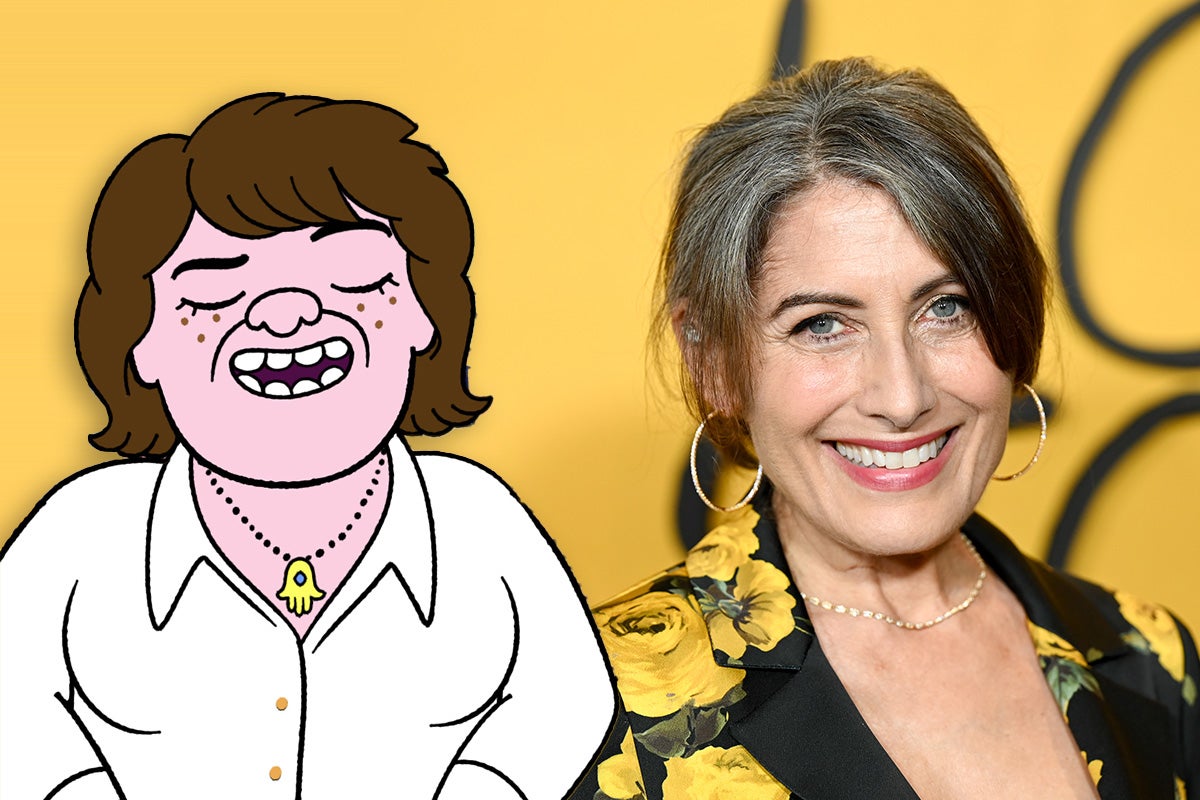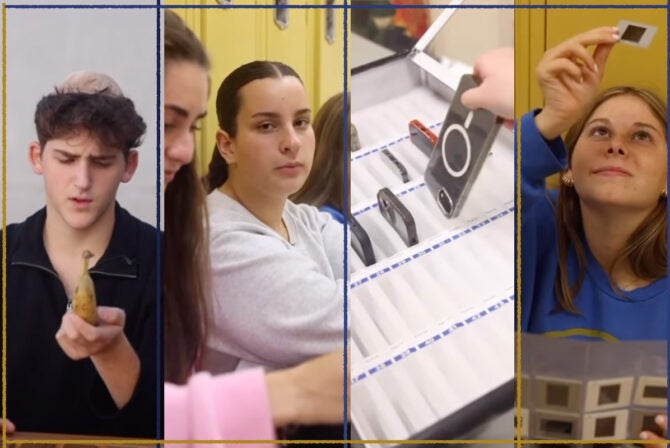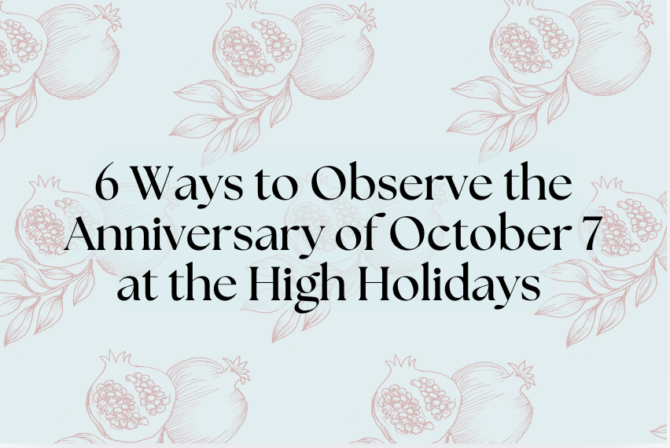This may be controversial, though I don’t think it should be: My favorite character in the new supremely Jewish Netflix show “Long Story Short” is family matriarch Naomi Schwartz, voiced by the indomitable Jewish actress Lisa Edelstein.
The animated series from Jewish creator Raphael Bob-Waksberg tells the story of the Schwooper family, a portmanteau of Schwartz and Cooper, that moves back and forth between timelines to reveal more about its members — Naomi, her husband Elliot Cooper (Paul Reiser) and their three children, Avi (Ben Feldman), Shira (Abbi Jacobson) and Yoshi (Max Greenfield).
Edelstein, who you may know from roles like Dr. Lisa Cuddy in “House,” Andy McCarthy in “Girlfriends’ Guide to Divorce” and Alan Arkin’s estranged daughter Phoebe in “The Kominsky Method,” is almost unrecognizable as the voice of Naomi, with a thick New York Jewish accent that feels haimish and familiar. She channels the voices of our ancestors, with that mile-a-minute, anxious and loving banter. We see Naomi move through her children’s bar mitzvahs and Shabbat dinners, keeping tradition alive in her kosher kitchen.
She might feel like the stereotype of a Jewish mom at first, the source of all her children’s primal wounds and mental afflictions, but as we discover so more about Naomi throughout the show — her love for her children in affectionate glances and whispered conversations, her kindness to strangers and friends at a JCC gala — it’s impossible not to fall in love with her.
Edelstein certainly did. The actress is no stranger to working on projects about Jewish families. Most recently, she starred in the award-winning Canadian show “Little Bird,” where she plays Jewish mom Golda Rosenblum whose adopted daughter, Esther, goes on a journey to reconnect with her First Nations family in Saskatchewan. Like Naomi, Golda struggles to find a way to do right by her daughter, but ultimately shows herself to be a truly loving Jewish mother in quite a heart wrenching and healing series.
And as a visual artist, Edelstein paints portraits of her own Jewish family that, like “Long Story Short,” make you feel like you’re a part of them.
Over e-mail, Edelstein told Kveller about why she insisted Naomi had to be an East Coast Jew, the surprise role and scene that made her the most emotional in season one, and why her family’s gefilte fish recipe is dying with her.
This interview has been lightly edited and condensed for clarity.
What was your initial reaction to Naomi’s character?
I fell in love with Naomi the second I read the script. Sometimes it takes a few readings to understand someone’s voice, but with Naomi I felt like I knew her right away. Raphael [Bob-Waksberg] says he didn’t plan on her being from the East Coast. I let him know he was INCORRECT (said as Naomi).
What are your thoughts about Jewish mom stereotypes and the way Naomi embodies some of them?
The only way to combat stereotypes is to inhabit any characters that risk being one with as much humanity and substance as I can. Naomi shoots out of the cannon in episode one with such fervor, one can easily mistake her as a one note character. But she isn’t. She’s so much more than even her family understands her to be. Sometimes you have to start from stereotypes, starting from where people expect, then trick them by demanding a deeper look. I think we begin to get there with Naomi midway through season one and it makes me happy.
What moment in the first season touched you the most?
I cried when Kendra went to services for Yom Kippur and she prayed with the elderly woman next to her. I actually played the elderly woman next to her and I still cried watching it. It’s such a beautiful and very, very Jewish moment. I have a thing for Yom Kippur!
I love her New York Jewish accent — it’s so comforting and familiar. What was it like speaking in it for this role?
I’m basically playing with my mother and grandmother’s accents and it makes me happy. It’s slightly faded, as she’s been in California for 30 years, but the rhythm of that accent feels like home to me.
Naomi is super connected to Jewish rituals — from keeping kosher, to doing community work, to making sure her kids get bar and bat mitzvah-ed, to cooking Shabbat dinner. What are the Jewish rituals that you’re most connected to?
I’m a big fan of rituals. When I make a (vegan, fresh, delicious, outrageous) challah, or light the Shabbat candles, it feels like a time machine. Like in that moment I’m connected to all the moments past and future where everyone in my family line is doing the same thing. All my ancestors and descendants, doing it together.
The episode “Shira Can’t Cook” is a super poignant meditation on grief, but also on the power of Jewish food and the recipes we pass down from generation to generation. What are the Jewish dishes that evoke similar feelings in you?
I’ve been a terribly disappointing descendant as I am completely vegan. I could make my grandmother’s kasha varnishkes and perogies, but I’m afraid the gefilte fish died with me.
Avi obviously has his thoughts about it, but what do you think Naomi would’ve thought of Hannah wanting to get her bat mitzvah?
I think she would have been thrilled!!!
I really connected to Avi and Shira’s experience at the JCC Gala, not really recognizing their mother as the person being spoken about so glowingly. What did you think of that episode?
I don’t believe you’ve grown up until you realize your parents are people. And I loved seeing Naomi so happy.
You’re a visual artist yourself, and you make art about Jewish family. What was it like watching the artistry in this show come to life?
It’s so much fun. This show, because it jumps back and forth through time, requires ornate mapping of moments and props that appear or disappear according to the historical events in each room. It’s quite a lot to keep track of! It’s taped up all the way across [animation director] Jack Shih’s office space. Color-coded and everything.
There are lots of lovely Yiddish words in this season — what’s your favorite Yiddish word?
I was going to say mittelschmerz but apparently that’s German. The Germans did it to me again!
I guess number two is kinehora. My grandmother used to say it anytime she complimented me. “You’re so beautiful KINEHORA.” Then she tried translating it and would just say, “You’re so pretty UGLY.”
What are you hoping to see from Naomi’s story in season two and any upcoming seasons?
I think Naomi has a deep impact on everyone in her life and so her stories will continue to be told, because there is literally no escaping Naomi!








